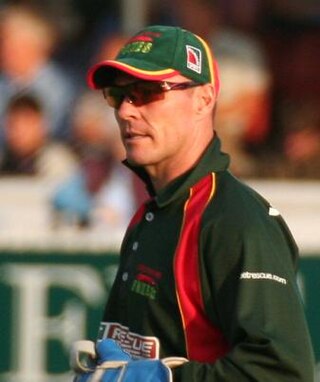Table
| Pos | Team | Pld | W | L | T | NR | Pts | NRR |
|---|---|---|---|---|---|---|---|---|
| 1 | 3 | 3 | 0 | 0 | 0 | 6 | 2.138 | |
| 2 | 3 | 2 | 1 | 0 | 0 | 4 | 0.418 | |
| 3 | 3 | 1 | 2 | 0 | 0 | 2 | −1.194 | |
| 4 | 3 | 0 | 3 | 0 | 0 | 0 | −1.389 |
The 2007 Cricket World Cup, which was played in the West Indies from 13 March to 28 April 2007, featured 16 teams, who were divided into four groups. Group C featured full ICC members England and New Zealand, and associate members Canada and Kenya. New Zealand beat England by 6 wickets in their opening match before beating Canada and Kenya by more than 100 runs each to finish top of the group, while England also managed comfortable wins against the two associate nations to join New Zealand in qualifying for the Super Eights. Kenya finished in third place by virtue of their opening victory over Canada.
| Pos | Team | Pld | W | L | T | NR | Pts | NRR |
|---|---|---|---|---|---|---|---|---|
| 1 | 3 | 3 | 0 | 0 | 0 | 6 | 2.138 | |
| 2 | 3 | 2 | 1 | 0 | 0 | 4 | 0.418 | |
| 3 | 3 | 1 | 2 | 0 | 0 | 2 | −1.194 | |
| 4 | 3 | 0 | 3 | 0 | 0 | 0 | −1.389 |
Kenya captain Steve Tikolo was named man of the match after playing all the way through the chase, coming in at 52/2, with David Obuya and Ravindu Shah dismissed in single figures with a strike rate below 25. Nevertheless, only Canada's captain John Davison conceded less than 3.5 runs an over, as the three first Canadian bowlers, Umar Bhatti, Anderson Cummins and Henry Osinde conceded 16 wides among the 107 runs in 22.2 overs. The Kenyan spinners, on the other hand, took five for 78 from 29 overs, "strangling the scoring rate". [1] Cummins became the second man to play World Cup cricket for two different countries, having represented West Indies in 1992.
Both teams had recently enjoyed series wins over Australia, but it was New Zealand who got revenge over England, who had beaten them for a place in the final of the January tri-series in Australia. England lost Ed Joyce for a duck off the first legitimate delivery of the match, and only Paul Nixon and Liam Plunkett, the numbers eight and nine, managed a strike rate above 70. With the fall of Paul Collingwood at the end of 35th over, New Zealand captain Stephen Fleming brought on Shane Bond, and he removed Kevin Pietersen, England's top scorer, and Andrew Flintoff in the same over. Jamie Dalrymple followed three overs later, as England had lost four wickets for five runs, but Nixon and Plunkett batted out the remaining 12 overs, making 71.
In reply, New Zealand lost two wickets in eight balls to James Anderson and Liam Plunkett, and also had captain Fleming back for a single-figure score. However, from then on they made 191 for the loss of only one wicket, Craig McMillan caught off Monty Panesar's bowling. Scott Styris and Jacob Oram added an unbeaten 138 for the fifth wicket, just ten runs off the New Zealand record from the 1999 World Cup, [2] resulting in a man-of-the-match award for Styris.
Ed Joyce's second fifty in as many matches helped England qualify for the Super Eights in what was essentially a play-off match, eliminating 2003 semi-finalists Kenya. Steve Tikolo came in at four after James Anderson had removed both openers, and though he made his 20th half-century, none of his team-mates passed 20. Extras were the second-highest contributor, with six wides and eight no-balls, most of the latter coming from Sajid Mahmood and Andrew Flintoff, who bowled three no-balls each. Flintoff did get Tikolo out with a yorker, [3] while three of Kenya's players were run out as they were bowled out on the last ball of the rain-reduced innings.
Kenya's opening bowler Peter Ongondo extracted "tennis-ball bounce" [3] to remove Michael Vaughan for one with the 19th ball of the game; however, despite Ian Bell getting caught for 16, England had reduced the equation to 126 off 34.2 overs after Joyce and Bell's partnership. With Kevin Pietersen also getting a fifty, England made it through with 10 overs to spare.

The 2003 ICC Cricket World Cup was the eighth Cricket World Cup, organised by the International Cricket Council (ICC). It was co-hosted by South Africa, Zimbabwe and Kenya from 9 February to 23 March 2003. This edition of the World Cup was the first to be played in Africa.
Middlesex County Cricket Club in 2005 played their cricket in Division One of the County Championship and Division Two of the totesport League. They started the season at 9–1 to win the County Championship title.
The Australia national cricket team landed in England on 6 June 2005. Over the course of the summer, they played one Twenty20 International, a triangular ODI tournament with both Bangladesh and England, a one-day tournament with England, and five Test matches, the outcome of which would decide The Ashes. With Australia the top-ranked team in the World Test table, and England the second-ranked, this was the most eagerly anticipated Ashes series since the 1980s.
Thirteen One Day Internationals were played in England in 2005 - 10 in the NatWest Series between England, Bangladesh and Australia, and three between England and Australia in the NatWest Challenge immediately following the Series.

The 2005 Ashes series was that year's edition of the long-standing cricket rivalry between England and Australia. Starting on 21 July 2005, England and Australia played five Tests, with the Ashes held by Australia as the most recent victors. The final result was a 2–1 series win for England, who succeeded in their biennial attempt to win the urn.
The England cricket team toured Pakistan from October to December 2005. England were looking to maintain the form that had taken them to second place in the ICC Test Championship, and to victory in the 2005 Ashes series at home to Australia, but they suffered a sharp reversal of fortune, losing the Test series 2–0 to Pakistan. Pakistan also won the one day series by 3–2. This would be England's last tour of Pakistan until 2022.
The English cricket team toured India during February, March and April 2006. The English cricket team was aspiring to maintain the form that took them to second place in the ICC Test Championship and helped them to win the 2005 Ashes series at home to Australia. This goal was substantially hindered by an injury to the captain Michael Vaughan; the swing bowler Simon Jones and the absence of Ashley Giles who missed the tour for an operation. As well as this, stand-in captain Marcus Trescothick flew home for "personal reasons", not wishing to divulge further, leaving Andrew Flintoff, who missed the birth of his son, to take on the title of skipper for the first time having to captain two maiden international cricketers on the English side: Alastair Cook and Monty Panesar. Shanthakumaran Sreesanth, Piyush Chawla and Munaf Patel made their debuts for the home team.
The 2005–06 Chappell–Hadlee Trophy was the second edition of Chappell–Hadlee Trophy, a three-match ODI series between Australia and New Zealand. It was played in New Zealand from 3 to 10 December 2005.

Paul Andrew Nixon is an English cricket coach and former professional cricketer who played for Leicestershire, England, England A, Marylebone Cricket Club (MCC) and Kent. He is a wicket-keeper and left-handed batsman. Nixon played in twenty international matches for the England cricket team, all within a four-month spell in 2007.

The 2006–07 ICC Intercontinental Cup was the third edition of the ICC Intercontinental Cup first-class cricket tournament, an international cricket tournament between nations who have not been awarded Test status by the International Cricket Council. Defending champions Ireland won the tournament after three wins and one drawn game, defeating Canada by an innings in the final, and stretched their streak of unbeaten matches in the Intercontinental Cup to eight.
Sri Lanka toured England for cricket matches during the 2006 international cricket season. England were back home for the first time since September and looked to maintain their Test standards, which saw them keep their second place in the ICC Test Championship in India, and the teams were also competing for sixth place in the ICC ODI Championship as both England and Sri Lanka were coming off the back of two lost ODI tours on the Asian sub-continent, against India and Pakistan respectively. To add to problems, both teams were likely to be missing some key members of the team as England were without some of their squad for their previous tour and, two days before Sri Lanka departed for England, it was revealed that skipper Marvan Atapattu would stay at home for the tour due to back problems that had forced him to skip his previous tour too. Jehan Mubarak was brought in as his replacement.
The 2006–07 cricket series between Australia and England for The Ashes was played in Australia from 23 November 2006 to 5 January 2007. Australia won the series and regained the Ashes that had been lost to England in the 2005 series. The five Tests of the series were played at Brisbane, Adelaide, Perth, Melbourne and Sydney. In winning, Australia completed a 5–0 "whitewash", the first time this had happened in an Ashes series since 1920–21. The series was also notable for the retirement of four significant Australian players, namely Justin Langer, Damien Martyn, Glenn McGrath and Shane Warne. Ricky Ponting was named Player of the Series.
The Commonwealth Bank Series was the name of the One Day International cricket tournament in Australia for the 2006–07 season. It was a tri-nation series between Australia, England and New Zealand.
The West Indian cricket team toured England from 12 May to 7 July 2007 as part of the 2007 English cricket season. The tour included four Tests, two Twenty20 international matches and three One Day Internationals. While England dominated the Test series 3–0, including a record victory over the West Indies, the latter took the ODI series 2:1.
The Super Eight stage of the 2007 Cricket World Cup was scheduled between 27 March 2007 and 21 April 2007, and determined the four qualifiers for the semi-finals of the tournament. Matches were held in Antigua, Bridgetown, Barbados, Georgetown, and Grenada.
The South African cricket team toured England between 29 June and 4 September 2008. They played four Test matches, one Twenty20 International and five One Day Internationals against England. They also played six tour matches against Somerset, Middlesex, Bangladesh A, a PCA Masters XI and two against the England Lions.
Play in Group A of the 2011 Cricket World Cup took place from 20 February to 20 March 2011. The group consisted of hosts Sri Lanka, and along with them, Pakistan, Canada, Kenya, New Zealand, Australia and Zimbabwe. This phase of the tournament was played as a full round-robin amongst all seven teams, with the top four teams advancing to the quarter-finals
The Kenya national cricket team is the team that represents the country of Kenya in international cricket matches. Kenya was part of the East Africa cricket team which became an associate member of the ICC in 1966, and competed in the first World Cup. Kenya first competed as an independent nation at the 1996 Cricket World Cup, after which they were given full ODI status, which they held until 2014, when they finished fifth in the 2014 Cricket World Cup Qualifier. Kenya's best performance at the Cricket World Cup was in 2003, where they reached the semi-finals.
The Ireland cricket team is the cricket team representing all of Ireland. Since 2017 they have been a Full Member of the International Cricket Council. Although Cricket in Ireland has had a presence since the early 1800s, it was in 1993 the Irish Cricket Union, the predecessor to Cricket Ireland, was elected to the International Cricket Council (ICC) as an Associate member. In the 1997 ICC Trophy, Ireland narrowly missed out on qualifying for the 1999 Cricket World Cup, which was ironically co hosted by Ireland, Scotland, England and the Netherlands. Ireland qualified for the World Cup for the first time in 2007, and has since played in the 2011 and 2015 tournaments, and the 2010, 2012, and 2014 World Twenty20 competitions. Ireland's best performance was in 2007, where they surprisingly qualified for the Super 8 Stages.

The England cricket team have appeared in every edition of the Cricket World Cup to date, being crowned champions in 2019. In addition, they were losing finalists in 1979, 1987 and 1992. England have been eliminated from the tournament in the group stage on five occasions